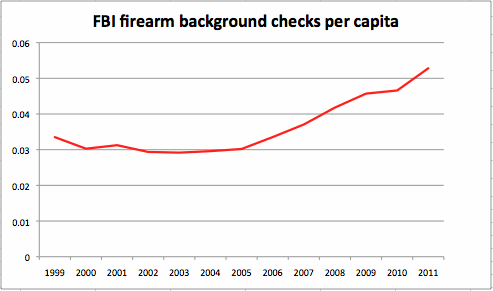A strange corollary of American politics is that the US small arms industry seems to prosper not when Republicans are in power but when there’s a Democrat in the White House. And when there’s a Kenyan-born Muslim socialist in the Oval Office, that’s especially the case.
Gun sales have soared in the US since the elections on November 6 and are running at their highest level for 14 years — in fact, since Bill Clinton was in the final years of his presidency.
After the surprisingly comfortable win by Barack Obama last month, the election of more women and wins in state referenda for issues like gay marriage and legalising dope smoking (including for medical use), you’d have thought the Land of the Free had relaxed a little.
Not so on the Right: applications for gun purchases soared in November to an all-time high of more than two million, as records from the FBI reveal. That’s the first time in the 14-year history of FBI background checks on prospective gun buyers that the number of applications had topped 2 million in a month. This year looks likely to see more than 18 million background checks for firearms, well up on 2011’s 16.5 million. Adjusted for population, it reflects how gun ownership has surged under a Democratic president.

The impact on gun companies is dramatic. Business is surging, pushing sales and profits higher for the likes of Smith and Wesson, one of the biggest gun makers in the US. In its second quarter profit announcement last week, the company told investors the improvement in sales had swollen profit margins by more than a third in the past year.
And the biggest US gun maker, Sturm, Ruger and Co, told the US market in late October that in the three months to September, “earnings increased 62% from the third quarter of 2011, driven by the 47% growth in sales”.
Sales jumped in many states, especially the hunting states of Texas, Ohio, Michigan, Alabama, Missouri, Pennsylvania, Virginia and the Carolinas, but also New York and California, though fell in some other likely suspects like Kentucky, Montana and Maine. Intriguingly, sales were slightly down in resource-rich states.
According to a recent Gallup poll, 47% of Americans own a gun — the highest percentage share since 1993.
Another, more recently emerged obsession of the Right in the US is with gold — many Tea Partiers, to the dismay of mainstream Republicans, urged a return to the gold standard, not out of any awareness of its economic implications but because it has the safe, nostalgic ring of the Founding Fathers to it. Demand for gold coins soared last month in the wake of the election result. Fears about the impact of the fiscal cliff with its spending cuts, higher taxes and possible damage to growth and employment, have been given as the reason for the surge in purchases.
The US Mint says its sales of American Eagle coins jumped 131% last month, which dealers put down to the election result and fears about the economic outlook among core investors. The Financial Times reported one dealer saying coin sales started rising sharply later in the week of the poll on November 6. So large has been the surge that gold coin sales in 2012 will be the highest in 14 years. Eagle coin sales in November totalled more than 131,000 ounces, or three times the level of November 2011 and the highest since November 1998.
“While coins are a small part of the overall gold market, the jump in sales highlights gold’s role as the favoured investment of disenchanted Americans. The political gridlock in Washington and the prospect of further quantitative easing when the Federal Reserve’s ‘operation twist’ expires at the end of this year have fuelled demand for precious metals among small investors,” FT reported.
Interestingly, the price of physical gold has dropped in the same time, falling under $US1685 an ounce late last week before rebounding to close around $US1711 overnight for not much change in the past six weeks. It seems some big investors, such as hedge funds, don’t see the need to hedge their positions or protect themselves by buying gold, copper, oil or other physical commodities, even though they could be paying more tax in 2013 and beyond.
Evidently they don’t have the same fears about the fiscal cliff, or inflation or the possibility of President Obama establishing a socialist tyranny.







Guns are more likely to be used on their owners, the people most likely to die from gunshot wounds are the people most likely to have a gun. So, horribly, the Democrats win from this… And the gold buyers keep our miners busy!
The logic is somewhat obscure on how toting a gun can save a US citizen from the heinous threat of national health care.
If republican gun owners end up using them on themselves, its clearly a win win. I’m all for improving the gene pool.
Armed bears apparently keep the militia regular. It’s all very important for some reason, possibly because Elementary Schools are hotbeds of anti-revolutionary pro-monarchist fervour.
The gold bugs will be vindicated in due course. If you can’t beat them (you can’t, fiat money is doomed), join them now while the price is reasonable.